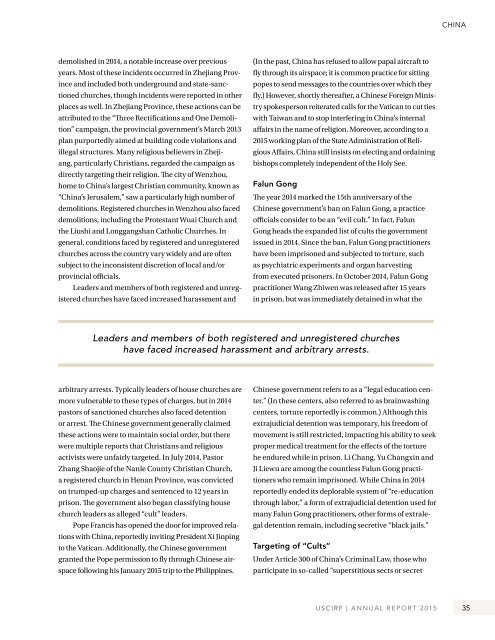USCIRF Annual Report 2015 (2)
USCIRF Annual Report 2015 (2)
USCIRF Annual Report 2015 (2)
You also want an ePaper? Increase the reach of your titles
YUMPU automatically turns print PDFs into web optimized ePapers that Google loves.
CHINA<br />
demolished in 2014, a notable increase over previous<br />
years. Most of these incidents occurred in Zhejiang Province<br />
and included both underground and state-sanctioned<br />
churches, though incidents were reported in other<br />
places as well. In Zhejiang Province, these actions can be<br />
attributed to the “Three Rectifications and One Demolition”<br />
campaign, the provincial government’s March 2013<br />
plan purportedly aimed at building code violations and<br />
illegal structures. Many religious believers in Zhejiang,<br />
particularly Christians, regarded the campaign as<br />
directly targeting their religion. The city of Wenzhou,<br />
home to China’s largest Christian community, known as<br />
“China’s Jerusalem,” saw a particularly high number of<br />
demolitions. Registered churches in Wenzhou also faced<br />
demolitions, including the Protestant Wuai Church and<br />
the Liushi and Longgangshan Catholic Churches. In<br />
general, conditions faced by registered and unregistered<br />
churches across the country vary widely and are often<br />
subject to the inconsistent discretion of local and/or<br />
provincial officials.<br />
Leaders and members of both registered and unregistered<br />
churches have faced increased harassment and<br />
(In the past, China has refused to allow papal aircraft to<br />
fly through its airspace; it is common practice for sitting<br />
popes to send messages to the countries over which they<br />
fly.) However, shortly thereafter, a Chinese Foreign Ministry<br />
spokesperson reiterated calls for the Vatican to cut ties<br />
with Taiwan and to stop interfering in China’s internal<br />
affairs in the name of religion. Moreover, according to a<br />
<strong>2015</strong> working plan of the State Administration of Religious<br />
Affairs, China still insists on electing and ordaining<br />
bishops completely independent of the Holy See.<br />
Falun Gong<br />
The year 2014 marked the 15th anniversary of the<br />
Chinese government’s ban on Falun Gong, a practice<br />
officials consider to be an “evil cult.” In fact, Falun<br />
Gong heads the expanded list of cults the government<br />
issued in 2014. Since the ban, Falun Gong practitioners<br />
have been imprisoned and subjected to torture, such<br />
as psychiatric experiments and organ harvesting<br />
from executed prisoners. In October 2014, Falun Gong<br />
practitioner Wang Zhiwen was released after 15 years<br />
in prison, but was immediately detained in what the<br />
Leaders and members of both registered and unregistered churches<br />
have faced increased harassment and arbitrary arrests.<br />
arbitrary arrests. Typically leaders of house churches are<br />
more vulnerable to these types of charges, but in 2014<br />
pastors of sanctioned churches also faced detention<br />
or arrest. The Chinese government generally claimed<br />
these actions were to maintain social order, but there<br />
were multiple reports that Christians and religious<br />
activists were unfairly targeted. In July 2014, Pastor<br />
Zhang Shaojie of the Nanle County Christian Church,<br />
a registered church in Henan Province, was convicted<br />
on trumped-up charges and sentenced to 12 years in<br />
prison. The government also began classifying house<br />
church leaders as alleged “cult” leaders.<br />
Pope Francis has opened the door for improved relations<br />
with China, reportedly inviting President Xi Jinping<br />
to the Vatican. Additionally, the Chinese government<br />
granted the Pope permission to fly through Chinese airspace<br />
following his January <strong>2015</strong> trip to the Philippines.<br />
Chinese government refers to as a “legal education center.”<br />
(In these centers, also referred to as brainwashing<br />
centers, torture reportedly is common.) Although this<br />
extrajudicial detention was temporary, his freedom of<br />
movement is still restricted, impacting his ability to seek<br />
proper medical treatment for the effects of the torture<br />
he endured while in prison. Li Chang, Yu Changxin and<br />
Ji Liewu are among the countless Falun Gong practitioners<br />
who remain imprisoned. While China in 2014<br />
reportedly ended its deplorable system of “re-education<br />
through labor,” a form of extrajudicial detention used for<br />
many Falun Gong practitioners, other forms of extralegal<br />
detention remain, including secretive “black jails.”<br />
Targeting of “Cults”<br />
Under Article 300 of China’s Criminal Law, those who<br />
participate in so-called “superstitious sects or secret<br />
<strong>USCIRF</strong> | ANNUAL REPORT <strong>2015</strong> 35


